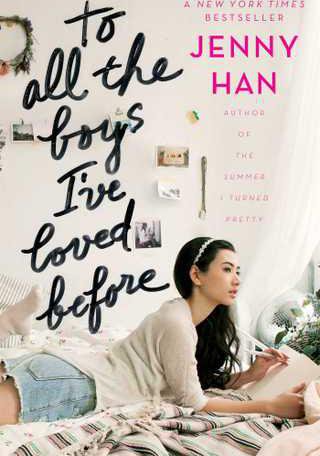![]() "TO ALL THE BOYS I'VE LOVED BEFORE," by Jenny Han, Simon and Schuster Books for Young Readers, $17.99, 365 pages (f) (ages 14 and up)
"TO ALL THE BOYS I'VE LOVED BEFORE," by Jenny Han, Simon and Schuster Books for Young Readers, $17.99, 365 pages (f) (ages 14 and up)
"To All the Boys I've Loved Before" by Jenny Han is an engaging book.
It starts out as if it's going to be a fluffy, inocuous book about teenage crushes, but it's actually a pretty honest look at a teen girl who doesn't know or understand her own power on others.
It includes believable, interesting dialogue between Lara Jean Song, the boys she's had a "fake" romance with, including the boy next door, and her own heart.
She's smart and clueless all at the same time, a girl who pours her heart into a hatbox full of letters — ones that she never intended to send — that somehow end up in the hands of the boys about whom she has had a crush on and eventually realized it was never going to work.
She says somewhat outrageous things while protecting herself from saying what she probably ought to just put out there.
As she deals with the fallout from the letters, she grows up a little and has to sort out her feelings while she keeps life going at home without her big sister, who has gone to a university across the Atlantic in Scotland, and mom, who died several years ago, with her little lost sister and her bereaved dad.
"To All the Boys I've Loved Before" is pleasant and full of tiny surprises. Han has created characters, including Peter the faux boyfriend, Josh the next-door first love, Kitty the little and somewhat spoiled sister and Genevieve, the popular, jealous girlfriend, who are authentic and real.
Han has a gift for making a fairly complicated story move along and making it all matter, whether it's in making six dozen cupcakes for a bake sale or putting up the Christmas decorations.
It's a good story, and the Song sisters are fun to get to know. The story flows nicely.
It's light and flirty with a great grasp of dialogue, particularly of teenage girl/boy exchange.
However, there's frequent mention of teenage sex as an expected part of a relationship, although none is detailed and Lara Jean doesn't participate, and a few swear words.
Sharon Haddock's personal blog is at sharonhaddock.blogspot.com.
Email: haddoc@deseretnews.com
'To All the Boys I've Loved Before' is readable, sweet


Latest
-
 Its toxic: New study says blue light from tech devices can speed up blindness
Its toxic: New study says blue light from tech devices can speed up blindness -
 This upset man was turned away from voting polls because he was wearing a MAGA hat; here's what th
This upset man was turned away from voting polls because he was wearing a MAGA hat; here's what th -
 Facebooks stock suffers the worst single-day market loss in history. Heres how much Mark Zuckerber
Facebooks stock suffers the worst single-day market loss in history. Heres how much Mark Zuckerber -
 Roseanne Barr speaks with Sean Hannity in first TV interview since racist tweet controversy. Here ar
Roseanne Barr speaks with Sean Hannity in first TV interview since racist tweet controversy. Here ar


